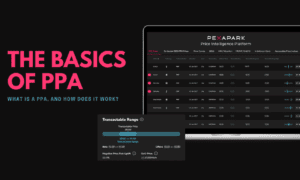Even in the renewable energy sector, tensile testing remains an essential part of determining the durability and resilience of materials used in wind turbines and solar panels. During this form of testing, tension is applied to a material to determine its strength and point of failure, which are necessary for renewable energy systems to last and perform efficiently.
Tests of tensile strength are integral to the sustainability and operational efficiency of renewable energy sources. Its indispensable role in this innovative industry is to gain a deeper understanding of these properties through tensile testing in order to develop more robust, efficient, and sustainable renewable energy solutions.
Tensile Testing and Material Selection in Renewable Energy
In the renewable energy sector, tensile testing plays a crucial role in material selection, especially for wind and hydrogen energy. Materials suitable for renewable energy applications, such as wind turbine blades and hydrogen storage tanks, must undergo tensile testing, which involves stretching them to determine their strength and failure point.
Fiberglass, for instance, has traditionally been used for wind turbine blades due to its cost-effectiveness. Carbon fiber, however, has emerged as a potential alternative due to advances in materials science. There are significant advantages to carbon fiber over fiberglass, notably in stiffness and strength, which can lead to longer blades and greater energy efficiency. Since blade lengths are increasing, carbon fiber has been explored for use in wind turbine blades as it reduces blade mass by up to 25% compared to fiberglass. Carbon fiber or fiberglass, however, is not just about performance, but also about cost, which is a decisive factor in the wind industry.
Materials used for high-pressure hydrogen storage tanks undergo rigorous tensile testing to ensure they withstand extreme pressures. High-strength composite materials are used to make these tanks, which are designed to store hydrogen at pressures up to 10,000 pounds per square inch. Tests must be conducted to ensure the durability and safety of the materials, including high pressures, extreme temperatures, and physical impacts.
The criteria for material selection in renewable energy applications are therefore based on balancing cost and performance. Material selection is influenced by tensile strength, durability, and long-term performance, but also by the economic feasibility of the material. To develop sustainable, efficient, and economically feasible renewable energy solutions, it is crucial to strike the right balance.
With tensile testing, material scientists are continuing to push the boundaries of what’s possible in renewable energy, aiming to achieve both sustainability and cost-effectiveness.
The Critical Role of Tensile Testing in Component Analysis
A rigorous tensile test is performed on the components of wind turbines, especially the rotor blades. In addition to maintaining aerodynamic efficiency, these blades must withstand a variety of environmental impacts. Often made of carbon fiber composites or enhanced fiberglass, these blades must withstand a range of environmental impacts while maintaining aerodynamic efficiency. To develop lighter and more efficient blades, it is essential to test these materials for tensile strength, fatigue resistance, and overall durability. Wind turbines also undergo detailed testing of their internal components, such as spar caps, bonded joints, and blade trailing edges. As a result, the turbines can handle dynamic loads and are thus more reliable.
High-pressure storage tanks are used in hydrogen energy applications. Materials that can withstand extreme conditions are essential for storing hydrogen at high pressures in these tanks. In real-world applications, these composite materials are subjected to cyclic loading and environmental factors as well as high pressures.
Besides these specific components, tensile testing covers a wide range of materials and parts in the renewable energy sector. Among these are the structural components of renewable energy infrastructure and the nacelles of wind turbines. As always, the goal remains the same: to guarantee that these components will be able to withstand the stresses they will encounter.
With such comprehensive testing, the renewable energy sector not only ensures the safety and performance of its components but also drives material innovation. Developing sustainable, efficient, and cost-effective renewable energy solutions aligns with the overarching goal of advancing renewable energy technologies.
Choosing the Right Tensile Testing Equipment
Choosing the right tensile testing equipment is paramount when it comes to renewable energy. Materials used in this sector are often subjected to extreme environmental conditions and mechanical stresses because of their unique demands.
- Accuracy and Precision: The equipment chosen must be accurate and precise. Tests conducted incorrectly could result in incorrect assessments of a material’s capabilities, potentially leading to premature failures or inefficient performance.
- Versatility: The equipment must be capable of handling different types of materials and tests due to the diversity of materials used in renewable energy (from metals in wind turbines to composite materials in solar panels).
- Durability and Reliability: Equipment must last over time, as consistent performance ensures test results accuracy. Long-term data accuracy is especially important in ongoing research and development.
- Advanced Features: Tensile testing machines offer advanced features such as automatic data collection, enhanced control systems for precise test conditions, and software integration for detailed analysis. Materials can be evaluated more comprehensively and in greater detail with these features.
- Compliance with Standards: Good tensile testing machine should comply with international testing standards. As a result, testing procedures and results are globally recognized and validated.
Renewable energy companies can ensure that their materials are both fit for purpose as well as contribute to the overall sustainability and efficiency of their applications by selecting the appropriate tensile testing equipment and right manufacturer. By making this careful selection, we are supporting the global transition to sustainable energy solutions and advancing renewable energy technologies.
Read More From Techbullion



































